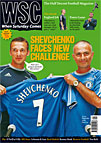 The current Middle East crisis has plunged Lebanon back towards chaos and badly damaged a football culture that had been a symbol of renewal after decades of strife. Hassanin Mubarak reports
The current Middle East crisis has plunged Lebanon back towards chaos and badly damaged a football culture that had been a symbol of renewal after decades of strife. Hassanin Mubarak reports
On July 3, the Lebanon squad played a warm-up game at the Amin Abdel Nour International Stadium in Bhamdoun, a popular tourist area in the mountains east of the capital, Beirut. Their opponents were Iraqi club side Kirkuk, from a volatile city in the north of Iraq ravaged by sectarian violence. The Iraqi club’s officials had hoped to use the training camp as preparation for the new 2006-07 Iraq league season, while the Lebanese were gearing up to host the fourth edition of the West Asian Football Federation (WAFF) Championship, a tournament featuring part of the “Axis of Evil”, Syria and Iran, as well as former member Iraq. A few days after this match, won 2-0 by Lebanon, planes and missiles ranged over the country, killing more than 600 civilians and wounding thousands, with more than a million displaced from their homes.
The WAFF Championship was to be the second international tournament staged in the Lebanon since the end of the 15-year civil war in 1990. Six years ago, the country hosted the Asian Cup, the equivalent of the European Championship. The Lebanese FA had spent several years organising the event and rebuilding stadiums and facilities in the country – helped by funding from hoteliers keen to redevelop the country’s Mediterranean resorts. On the eve of the competition, the region was beset by conflict again, when Israeli helicopter gunships bombed Palestinian president Yasser Arafat’s headquarters in the West Bank city of Ramallah. The tournament passed off peacefully, though the hosts were a big disappointment, failing to get out of their group – they lost 4-0 to Iran, then drew with Iraq and Thailand.
To bolster the squad, the LFA had recruited five players from Brazil, where there are more than five million people of Lebanese descent. All would go on to play for local clubs but none shone at the Asian Cup and the LFA’s initiative was widely criticised. Now, with the team forced to withdraw from the 2007 Asian Cup qualifiers, we shall not see how the current squad would get on.
From the beginning of football in Lebanon, the main clubs drew on support from specific communities. Al-Ansar, champions 12 times since the resumption of an organised league in 1988, have predominately Sunni Muslim players and fans, while their Beirut rivals Al-Nejmah are Shia. La Sagesse and Hikma are Christian Maronite clubs, while the country’s large Armenian community follows either Homenetmen or Homenmen (their names come from acronyms for Armenian General Athletic Union and Armenian Athletic Association).
Several of the community teams are now in the lower divisions, superseded by provincial sides with no ethnic affiliations, though the league is still dominated by Beirut clubs. From the start of the 1990s foreign coaches and players began to arrive, from as away as Trinidad. In 1994-95, Tadamon Sur, from the southern city of Tyre, were propelled into the first division by the goals of a 16-year-old from Sierra Leone, Mohamed Kallon, who then moved on to Inter. Kallon’s strike-partner was Wael Nazha, whom many locals thought was going to become a major star. Wael became the highest paid player in Lebanese football history after his $220,000 move to Al-Nejmah in 1997, but he failed trials in Switzerland and Italy and, after a year in Greece, moved to England, where he has only played at non-League level, at teams such as Stevenage and Frickley.
Until the start of hostilities in 1975, almost all the foreign players turning out for Lebanese teams came from neighbouring Arab countries. The best known was striker Jabra Al-Zarqa, born in Haifa in what was then Palestine. He was even offered a contract by Arsenal after a scout saw him score a hat-trick for Shabab Al-Arab (Arab Youth) in a 4-3 win over the British army team Wanderers in Haifa in 1945. After fleeing Haifa, Al-Zarqa played in Jordan then represented Syria, with whom he won the 1957 Pan Arab Games held in Beirut.
In that era, the Lebanon team, with representatives of the various sects, were good enough to take on the best sides in the region and played friendlies against European opponents, including Ferenc Puskas’s Hungary. The civil war changed everything, with opposing teams not prepared to cross the Green Line of Beirut, the boundary dividing the Christian east and the Muslim west. Today Lebanese teams have players of all religions playing with and against each other, though whether the league resumes on time in November is somewhat beyond the control of the game’s authorities.
From WSC 235 September 2006. What was happening this month